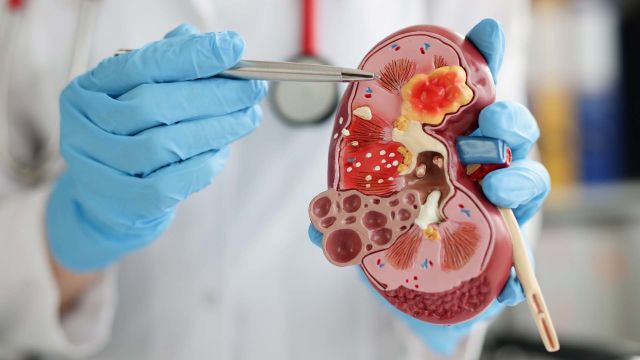Kidney disease refers to conditions that cause a gradual loss of kidney function. The kidneys are a pair of fist-sized organs that act as filters for the body, removing waste and excess fluid from the blood, so that it can be excreted as urine. The clinical term for kidney disease is nephropathy.
Glomerular disease
Immunoglobulin A nephropathy (IgA nephropathy) is an autoimmune disorder that causes kidney disease. More specifically, it is a glomerular disease, because it affects the glomeruli, networks of tiny blood vessels contained within the kidneys. The glomeruli are the part of the kidneys that filter the blood as it passes through. The word for an individual glomeruli is glomerulus, which is derived from the Greek word for “filter.”
When glomeruli become damaged, substances that should be kept separate from the urine—like proteins and blood cells—end up in the urine. Blood and/or protein in the urine is a common sign of IgA nephropathy. Many people who have IgA nephropathy report seeing blood in their urine. In other cases, blood and protein is detected during urinalysis.
Causes and risk factors
Medical researchers have yet to fully unravel the causes of IgA nephropathy, or why some people have IgA nephropathy and others do not. In some cases, the onset of symptoms is associated with respiratory and/or intestinal infections.
There is some evidence that genetics play a role, and IgA nephropathy is known to run in families. It’s also more likely to affect people of certain ethnicities, with Asian people at the highest risk. Caucasians (particularly Caucasian males) are also at a higher risk than other ethnic groups, though IgA nephropathy can affect anyone.
Autoimmune disease
While the causes are not fully understood, research has given us a good understanding of what is happening in the body when a person has IgA nephropathy.
Immunoglobulin A is an antibody, a protein that is released by the immune system. Under normal circumstances, antibodies are released in response to things like viruses, harmful bacteria, and toxins (which can be broadly referred to as antigens). Antibodies attach to antigens, marking them for destruction by immune cells.
With IgA nephropathy, the body makes abnormal immunoglobulin A (it’s deficient in a specific type of sugar called galactose). As a result, the abnormal immunoglobulin A becomes a target for other antibodies, which attach and form clusters that can clog up glomeruli.
Kidney disease and complications
The immune system attacks the clogged-up glomeruli, causing inflammation and damage—and eventually, a decline in how well the kidneys function. When the kidneys do not function well, other things start to go wrong—including higher blood pressure, other kidney problems, and over time, kidney failure.
While there is no cure, there are therapies that can help slow the progression of the kidney disease and help you avoid complications. Therapies include medications to help lower blood pressure and medications that act on the immune system to control inflammation. A kidney-healthy diet is also an important part of treatment.
If you have IgA nephropathy, the best thing you can do is work with a nephrologist, a healthcare provider that specializes in diseases that affect the kidneys.






